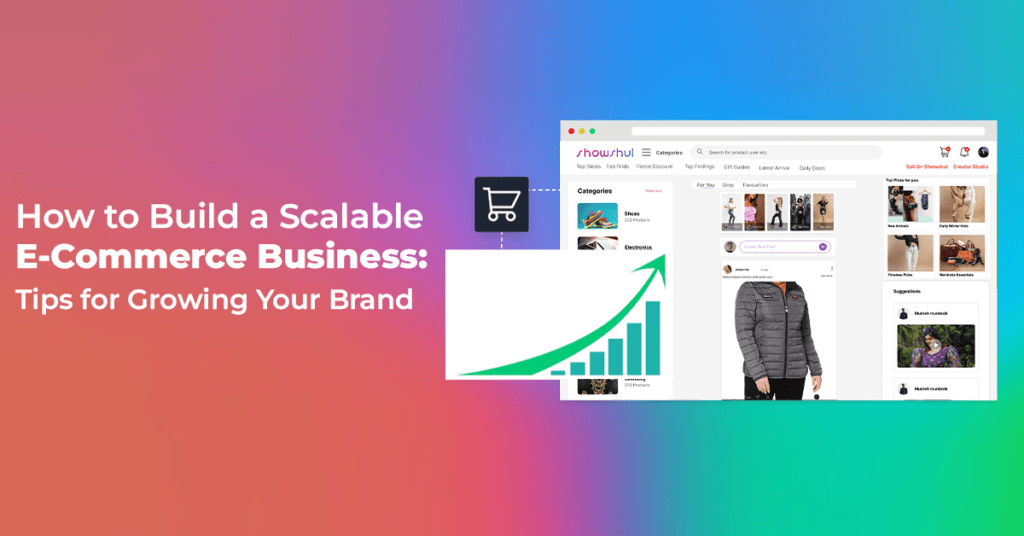Scaling an e-commerce business is an exciting yet challenging process. While growth brings opportunities to increase revenue and brand recognition, it also demands careful planning and execution to maintain quality and consistency. For entrepreneurs wondering, “How do you scale a business?”, this guide provides actionable tips to help you expand strategically while staying true to your brand’s identity.
Why Scaling Matters in E-Commerce
The e-commerce landscape is growing rapidly, with global sales projected to reach $6.3 trillion by 2024 (Statista). This growth opens up immense opportunities for brands ready to scale. However, as you navigate e-commerce growth, balancing customer satisfaction with operational efficiency becomes critical. Building a scalable business ensures you can meet increasing demand without compromising quality or customer experience.
1. Develop a Clear Growth Strategy
The first step in scaling your e-commerce business is defining your growth goals and strategy. Consider:
- Market Analysis: Identify new target markets and trends in online retail.
- Revenue Goals: Set realistic revenue milestones for the next 6–12 months.
- Product Expansion: Evaluate opportunities to expand your product line to meet customer needs.
Example:
Brands like Allbirds successfully scaled by introducing new product lines while staying true to their sustainable ethos. Their strategy catered to their target audience’s values, ensuring long-term loyalty.
2. Leverage Automation for Efficiency
As your business grows, manual processes can hinder progress. Implementing automation tools can streamline operations, save time, and reduce errors. Key areas to automate include:
- Inventory Management: Use tools like TradeGecko or Cin7 to monitor stock levels.
- Customer Support: Implement chatbots like Zendesk to handle routine inquiries.
- Order Fulfillment: Partner with platforms like ShipStation for seamless order processing.
Automation ensures your business runs efficiently, even as order volumes increase.
3. Outsource Non-Core Functions
Scaling often requires additional resources, and outsourcing can be a cost-effective solution. By delegating non-core tasks to experts, you can focus on growth strategies. Consider outsourcing:
- Logistics and Warehousing: Partner with third-party logistics (3PL) providers.
- Digital Marketing: Hire agencies or freelancers to manage campaigns and SEO efforts.
- Content Creation: Collaborate with creators for engaging product descriptions, photos, and videos.
Example:
Brands like Gymshark utilized outsourcing during their growth phase to handle fulfillment, allowing their team to concentrate on brand building.
4. Expand Your Product Line Strategically
Diversifying your product offerings can attract new customers and increase revenue from existing ones. When adding new products:
- Conduct Market Research: Ensure demand exists for the new product.
- Focus on Cross-Selling Opportunities: Introduce complementary products to boost average order value.
- Maintain Brand Consistency: Align new products with your brand identity to avoid confusing customers.
5. Optimize Your Website for Scalability
Your website is the backbone of your e-commerce business, and it must handle increased traffic and transactions during scaling. Key optimizations include:
Speed and Performance: Use tools like Google PageSpeed Insights to ensure fast load times.
Mobile Optimization: Ensure your site is responsive for mobile users, who account for over 50% of online shopping traffic.
Platform Scalability: Consider using platforms like Shopify Plus or BigCommerce that support high-growth businesses.
6. Focus on Customer Retention
Acquiring new customers is essential, but retaining existing ones is more cost-effective. Strategies to enhance customer loyalty include:
- Personalization: Use data-driven insights to deliver tailored recommendations.
- Loyalty Programs: Reward repeat customers with discounts, points, or exclusive offers.
- Exceptional Service: Provide prompt and helpful support to resolve issues.
7. Address Common Challenges of Scaling
Scaling isn’t without its hurdles. Some common challenges and how to overcome them include:
- Cash Flow Management: Secure funding through loans or investors to manage increased operational costs.
- Maintaining Quality: Implement quality control processes to ensure consistent product standards.
- Talent Acquisition: Hire skilled professionals to fill key roles as your business expands.
Example:
Warby Parker faced challenges during its growth phase but overcame them by investing in quality control and customer service, ensuring a seamless experience for its customers.
8. Use Data to Drive Decisions
Scaling requires informed decision-making, and data is your best ally. Track key metrics such as:
- Customer Acquisition Cost (CAC): Measure how much you spend to gain a new customer.
- Lifetime Value (LTV): Understand the long-term value of your customers.
- Conversion Rates: Monitor how well your website turns visitors into buyers.
Use analytics tools like Google Analytics and Klaviyo to gather insights and adjust strategies accordingly.
9. Stay True to Your Brand Identity
Amid growth, it’s easy to lose sight of what made your brand unique. To maintain your identity:
- Stay consistent with your brand messaging and visuals.
- Prioritize your brand values in decision-making.
- Engage directly with your community through social media and events.
10. Draw Inspiration from Success Stories
Learning from brands that have scaled successfully can provide valuable insights. Take inspiration from companies like Casper, which grew by focusing on direct-to-consumer sales, or Glossier, which leveraged community building to drive growth.
Why Showshul is Your Partner for Growth
At Showshul, we understand the challenges and opportunities of scaling an e-commerce business. Our creator-led social commerce platform bridges the gap between performance marketing and brand awareness, helping sellers grow their brands while maintaining quality and customer trust.
Why Choose Showshul?
- Connect with a vibrant community of creators, buyers, and brands.
- Leverage tools designed to boost visibility and sales.
- Scale your business seamlessly with our supportive ecosystem.
Ready to take your business to the next level?
BECOME A SELLER TODAY WITH SHOWSHUL
Conclusion
Scaling an e-commerce business is a journey that requires strategic planning, efficient operations, and a commitment to quality. By following the tips in this guide—from leveraging automation to expanding your product line—you can position your brand for sustainable growth. Partner with platforms like Showshul to amplify your efforts and connect with a community that supports your vision. Start scaling your business today and unlock new opportunities in the ever-evolving e-commerce landscape!


